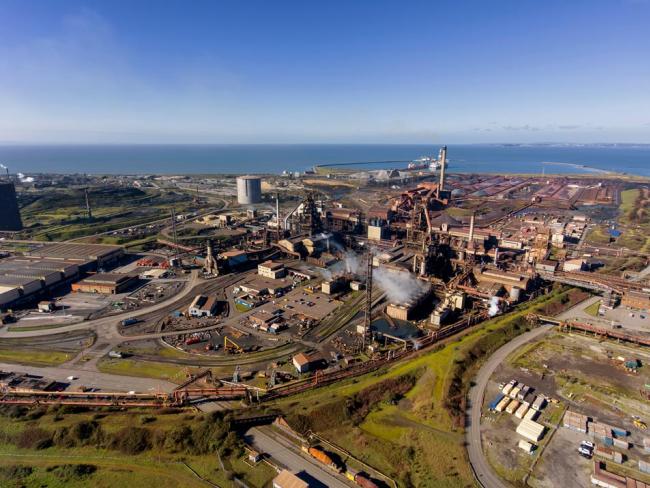
Port Talbot steelworks, South Wales. It is owned by the Indian conglomerate Tata. Photo Leighton Collins/shutterstock.com.
Without a steel industry Britain will be dependent on other countries for our strategic infrastructure. Yet the government will not take the steps needed to keep it alive…
The British steel industry now hangs by a thread. In 2019, British companies produced a mere 7 million tonnes of steel. In contrast, the EU produced 157 million tonnes, and China made 996 million tonnes.
In May, trade body UK Steel said that high energy prices and weak demand were taking an “enormous toll” on steel production in Britain. Its figures show that production in 2022 slumped 17 per cent in just one year, with output down to the lowest level since the Great Depression of the 1930s.
“The already challenging demand environment is only worsened by elevated energy prices,” said UK Steel director Gareth Stace. “Steel companies in the UK are footing electricity bills of 60 per cent more than our direct competitors in Germany.”
Yet for all that, as Alun Davies, national officer at steelworkers’ union Community, pointed out after the government’s Powering Up Britain policy paper was published at the end of March, the steel industry is a vital component of Britain’s economy, and plays a critical role in the country’s national security.
The 33,000 skilled jobs in steel and the 40,000 in the supply chain provide well-paid employment in areas like South Wales where such jobs are in short supply. The government talks of “levelling-up”, with no indication of how that will happen – it has no idea how, and no real wish to do so.
Accusing the government of “inaction” and “negligence”, Community warns that a failure to invest and safeguard the future of the steel industry now threatens its future. Without its own steel industry, Britain will be left vulnerable, completely dependent on other countries for strategic infrastructure and at the mercy of unpredictable global supply chains.
Sharon Graham, general secretary of Unite the Union, has also slammed the government’s failure to support the steel industry in the recent Budget. She expressed disappointment at the absence of measures to tackle the serious threats facing the sector despite ministerial commitments that steel would be supported.
Writing to Prime Minister Rishi Sunak after the March budget, Graham highlighted union concerns that the recovery in manufacturing following the Covid pandemic could bypass Britain’s steel industry.
Welcoming the government’s financial support to keep Britain’s last four blast furnaces going, Graham pointed to the much greater levels of support that the steel industries in Germany and France receive from their respective governments.
Unite has called for much tougher measures to ensure that domestically produced steel is used in new infrastructure projects. These projects are being cut back, another unwise government policy.
Worries
The unions are right to be worried. In February, Business Secretary Kimi Badenoch was asked on Sky News whether Britain would always need a steel industry. Astonishingly, her answer was: “Nothing is ever a given.”
The government’s energy strategy set out in Powering Up Britain inevitably talks of meeting “net zero” commitments. But it also sets out four goals: energy security; consumer security; climate security; and economic security.
Alun Davies at Community was not impressed. He said: “We are disappointed to see the Government failing again to address the burning issue of crippling energy costs in the steel sector…
“The Government promised we will have affordable energy by 2050, but jobs are being lost now and our steel industry cannot wait any longer. We urgently need to reduce energy costs to compete internationally…”
The government, he said, must deliver on its Brexit promise to slash energy costs and protect our steel industry.
In May, Tata Steel said there was “material uncertainty” over the future of its business in Britain. Tata Steel has an enormous local and regional impact on Wales. It owns Port Talbot steelworks, an integrated steel-making site using imported ore and local and imported coking coal.
The use of local coking coal has been attacked because of climate change and the drive to net zero. Different proposed solutions to the release of carbon dioxide into the atmosphere at Port Talbot include carbon capture and replacing the blast furnaces by an electric arc furnace.
‘Government must deliver on its Brexit promise to slash energy costs and protect our steel industry…’
Together with Llanwern steelworks (the blast furnaces at Llanwern are mothballed), the South Wales plants produce up to 3.5 million tonnes of hot rolled and cold rolled steel coils each year, for a variety of different end uses. Output is taken by rail to Shotton in North Wales for coating; Trostre in South Wales near Llanelli for tinplating; or direct to the Midlands for the motor industry and domestic goods manufacture.
Port Talbot is capable of producing nearly 5 million tonnes of steel slab a year. This makes it the larger of the two major steel plants in Britain and one of the largest in Europe. Over 4,000 people work there.
Trade unions are not the only people talking about the importance of steel. Henrik Adam, chair of Tata Steel UK, was quoted in the Financial Times in May as saying, “I believe that having a manufacturing industry is a core of a modern economy… If you stop making steel in the UK, why should the remaining manufacturers stay in the UK?”
The message from the employers cuts through the waffle from the government about making all production “green”. That can only be achieved with present levels of investment and technology by axing everything else.
The government talks about achieving its aims by 2050. At this rate, though, there may not be a steel industry in this country by 2050. the industry needs firm guarantees on investment from the government, and action to subsidise electricity prices – at least to the level that competitors in Europe and elsewhere enjoy.
